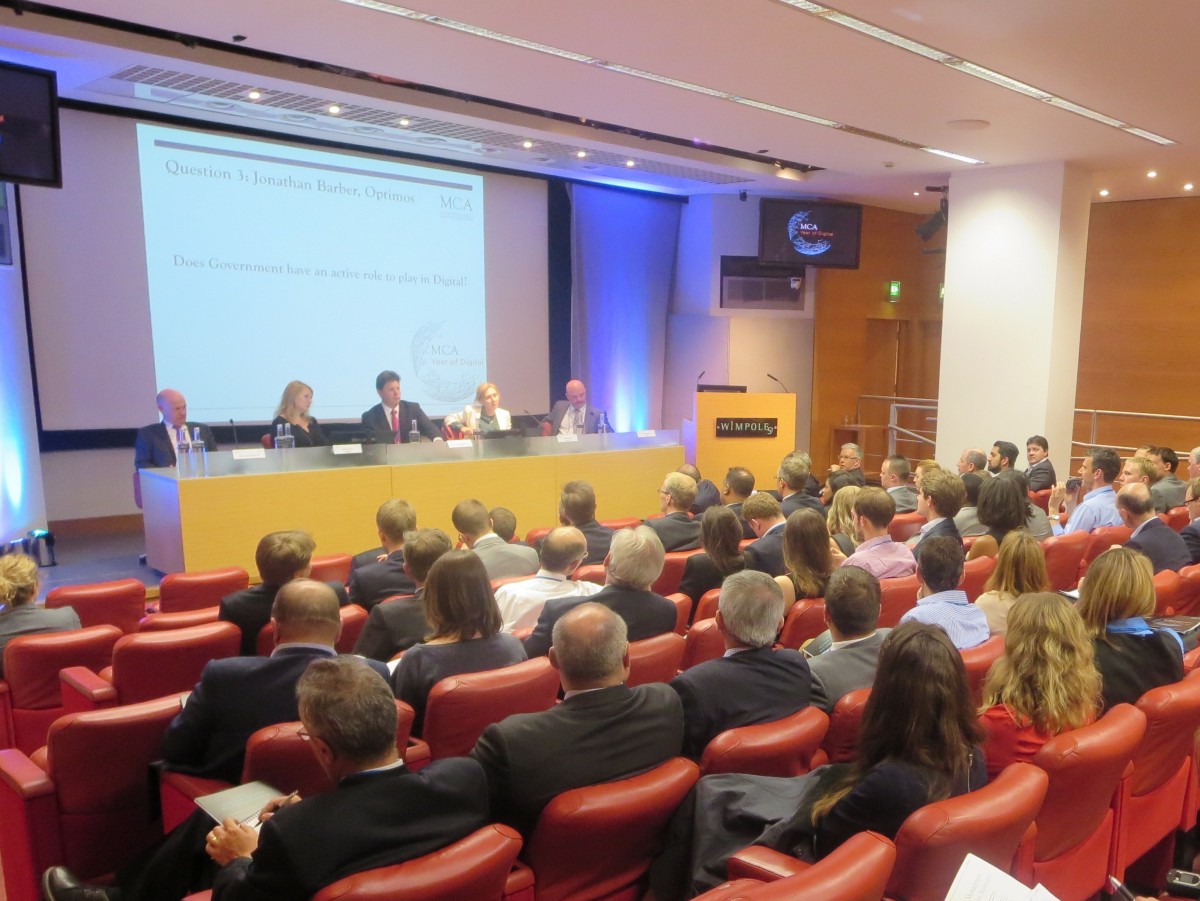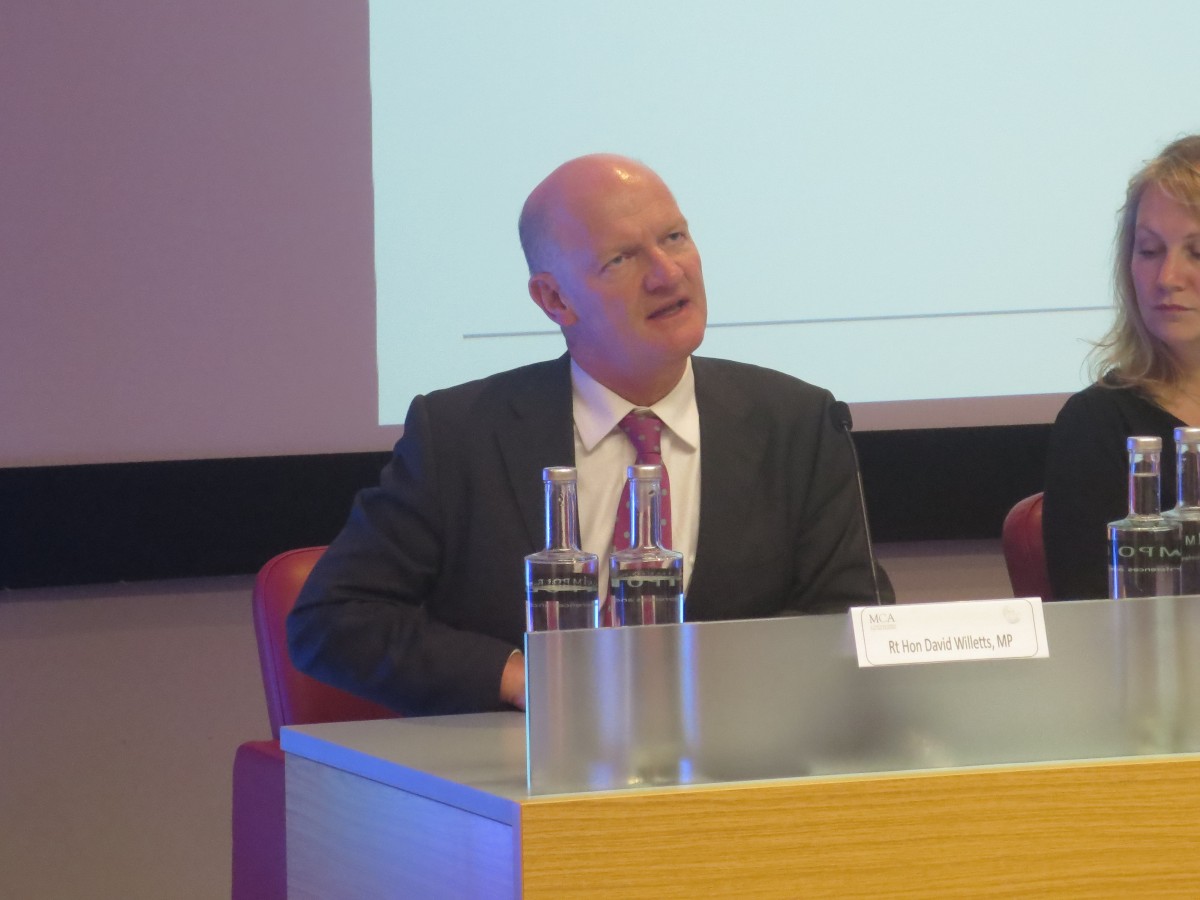
Two thirds of leading management consultants[1] (67 per cent) agreed that Digital is the biggest opportunity for British business since the Industrial Revolution. However, due to its rapid development, finding the appropriate level of digital skills amongst graduates is an increasing problem for the economy.
This is reinforced by an exclusive MCA survey of Britain’s boardrooms[2] which reveals that, while 94 per cent of senior executives view digital as important or very important to their businesses, a fifth report that the quality of digital skills amongst graduates is average to poor.
The Rt Hon David Willetts MP – the Minister for Universities and Science – who was an expert panellist at the MCA Annual Debate, highlighted the impact of the UK’s unusually specialised education system. He said: “There are still too many horrific decisions at 16 in our unusually specialised system, where people give up subjects that no other western advanced country would give-up.
In this digital world, having the English that enables you to communicate well, a second language, some basic understanding of maths and physics, and a broader base for longer will be very valuable.”
Elizabeth Varley, Chief Executive of Tech Hub, an expert panellist added:
“The idea of recognising when something isn’t working rather than feeling so invested in this decision that you’ve made that you can’t say to your boss ‘I think we’ve got this wrong I would rather try it this way’ is a skill that we’re not teaching. We’re afraid that we will be penalised either socially or financially, and we need to get over that in order to innovate better.”
Do business leaders get digital?
The MCA survey found that almost all executives say they understand Digital very well or well; but they have a very wide range of understandings of what it actually means. The expert panel and the vast majority of management consultants (91 per cent) felt that business leaders don’t get digital, and there is limited understanding of its role and potential across Britain’s boardrooms.
Rachel Barton, Managing Director at Accenture for Customer Strategy and expert panellist said: “Boards do recognise that Digital is important. But I do not believe that boards understand it and they certainly do not recognise the fundamental shift it is going to have in their organisation beyond the introduction of a new channel.”

Government’s role in digital
Both consultants and expert panellists also agreed that government has an active role to play in Digital.
David Willetts MP (pictured above) said: “When we look at ‘the internet of things’ for example – and you want your BMW to communicate with your fridge – to communicate with your thermostat – in order to make all of this to happen you need amazing standards and interconnectivity.
“So both high level science that drives significant capabilities and sufficient investment to ensure that you have a role in standards setting are the two things that governments can also do.”
The panel also argued that government can do a lot to bring digital closer to citizens, particularly through its own role as a service provider and in promoting greater connectivity.
Personal digital data as a valuable currency – Government’s role
The debate threw up some very radical ideas about the future of Digital in empowering citizens and consumers. Expert panellist Carlo Gagliardi of PwC suggested that personal data could become a personal asset and a valuable currency, like money. He said: “Today most of the digital data that we create is actually legally ours but the companies that hold this data can do a lot of things with it. But if people get control of it, then it can become like currency that they deploy in order to achieve a specific goal, or to get better goods and services.
“I believe Central Government could play a key role in making people more aware that data's potential for them could translate into some valuable gains in just a few years, and in some cases even earlier.”
The MCA’s boardroom survey also found that executives would welcome advisory support to understand its challenges in the future. Paul Connolly, Director of the MCA Think Tank, concluded: “Digital is creating uncertainty and unpredictability, but it also creates value fast. It has also reduced the costs of risk-taking, so firms can mobilise new ideas quickly and cheaply. However, Britain’s boardroom’s are recognising that skills are becoming short in supply amongst new recruits, and they are also requiring specialist external advice to guide themselves through the challenges of Digital.
This is why MCA Management consultants are at the heart of Digital – working on major programmes to Digitise products, provide research and development capabilities for new ideas, and stress test firms to see if they can withstand Digital disruption and capitalise on its opportunities. Indeed, no industry is better placed than ours to grasp and articulate the scale of the challenge – even threat – that Digital represents, as well as its manifold and exciting opportunities.”
The MCA Annual Debate, Our Digital Future, also marked the launch of the MCA’s Year of Digital, a series of high profile events, research and Think Tank reports. In addition to David Willetts expert panellists in the debate were Elizabeth Varley, Chief Executive of TechHub, Rachel Barton of Accenture and Carlo Cagliardi from PwC.
The rise in digital consulting was recently highlighted by MCA data that found that the rapidly growing Digital & Technology service line now accounts for a quarter of consulting revenues, and its market share rose by around 6 per cent in 2013.
– ENDS-
[1] A poll of around 200 senior MCA management consultants, 10th July 2014
[2] Research Now, June 2014. Over 100 senior executives interviewed.
For more information, please contact:
David Pippett
Director
DWP Public Relations
Tel: 01225 335675/Mobile: 07899 798197
Email: david@dwppublicrelations.co.uk
The Management Consultancies Association (MCA)
The MCA is the representative body for management consultancy firms in the UK. Its mission is to promote the value of management consultancy for the economy and society as a whole. The MCA's member companies which is over 60 per cent of the UK consulting industry, employ around 35,000 consultants and work with over 90 of the top FTSE 100 companies and almost all parts of the public sector. The UK consulting industry is amongst the best in the world and a vital part of the business landscape.
Compliance with the MCA's tough entry criteria and rigorous Code of Practice means that MCA member companies are widely acknowledged to provide high quality services to their clients
